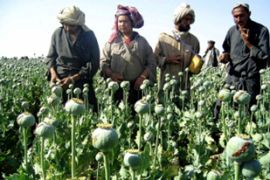Drug cartels ‘avoiding prosecution’
Report says targeting of small-time users is encoraging a “rampant flow” of drugs.

Cultivation increase
Bolivia reacted angrily to the suggestion that it stop producing coca leaves, the raw material form which cocaine is produced.
“It is just something they want to impose,” Juan Ramon Quintana, chief of staff to President Evo Morales, said. “I wish the INCB could ban people from smoking or drinking alcohol.”
|
Related link | ||
|
Bolivia allows legal production of a limited amount of the crop for use in traditional teas. The leaf also is chewed as a remedy for altitude sickness.
The 127-page annual report from INCB, also says that governments need to make greater efforts to freeze traffickers’ assets, and improve access to drug treatment programmes.
Drug traffickers in Afghanistan have also been targeted by the UN, in which the organisation demanded that the government should crack down on traffickers, some suspected to have links to government officials.
Corruption
Christian Gynna Oguz, country director for the UN Office on Drugs and Crime, said Afghanistan remains the world’s largest producer of opium and heroin and that drug dealers and corrupt government officials operate with impunity.
“Such situations can no longer be tolerated if Afghans are to have the type of judicial system and functioning institutional structures that they deserve.”
In 2007, farmers cultivated a record 193,000 hectares of opium, a 14 per cent increase over the previous year.
